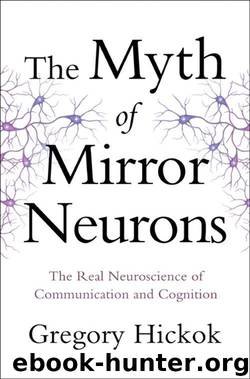The Myth of Mirror Neurons: The Real Neuroscience of Communication and Cognition by Gregory Hickok

Author:Gregory Hickok [Hickok, Gregory]
Language: eng
Format: epub, mobi
Publisher: W. W. Norton & Company
Published: 2014-08-17T20:00:00+00:00
I had no idea that a change in the “intonation contour” of a sentence, as linguists put it, could be as contagious as the common cold. But before long I noticed a Jekyll-and-Hyde transformation in my own speech. I first heard it when I myself was leaving a message. “This is Jim Gorman? I’m doing an article on Klingon? The language? From ‘Star Trek’?” I realized then that I was unwittingly, unwillingly speaking uptalk.7
In all these cases information impinging on your ears is messing with the auditory targets of your speech gestures, like someone fiddling with the position of a dartboard in the middle of a game. In the first case, delayed auditory feedback disrupts the timing delay between when your brain sends the speech movement commands and when the auditory feedback is expected, therefore tricking the system into thinking that a motor programming error has occurred and needs to be fixed. In the second case, the background TV dialogue puts an external target in front of you and you reach for it reflexively, so to speak. In gestural drift, being surrounded by examples of a particular speech pattern (or auditory target) eventually replaces your old targets with new ones, thus changing your own speech pattern. (Targets can be stored sensory memories as well as physical objects in the environment, and like most memories they are subject to modification.)
Parenthetically, despite claims to the contrary, uptalk is not a reflection of self-doubt or indecisiveness, as pointed out by linguist Mark Liberman.8 The popular interpretation assumes that uptalk statements are questions, but they’re not. They are something closer to a contraction. Uptalk statements might have started out as something like, My students had this rising intonation thing. You know? but then You know? got dropped and the question intonation shifted onto the end of the statement. To understand uptalk’s function, just think about what function You know? serves. It is to control your listener’s attention and to make sure they are with you in the conversation. It has more to do with control than indecisiveness.
No matter where we look, action is firmly and indispensably grounded in sensory systems. Is the reverse true? Are sensory systems indispensably grounded in action? Not so much. We’ve seen example after example of how we can understand the world without the ability to act. You don’t need to be able to speak to understand speech. You don’t need to be able to smile to understand smiles. You don’t need to be able to fly to understand flying. While the motor system is absolutely dependent on sensory systems to get anything done, the reverse is absolutely not the case. The relation is asymmetric.
Download
The Myth of Mirror Neurons: The Real Neuroscience of Communication and Cognition by Gregory Hickok.mobi
This site does not store any files on its server. We only index and link to content provided by other sites. Please contact the content providers to delete copyright contents if any and email us, we'll remove relevant links or contents immediately.
The Hot Zone by Richard Preston(2013)
Rigor Mortis by Richard Harris(1712)
How Innovation Works by Matt Ridley(1642)
Oxymoronica by Dr. Mardy Grothe(1560)
Mawson's Will by Lennard Bickel(1454)
Kathryn Bowers & Barbara Natterson-Horowitz by Zoobiquity(1420)
THE DEMON HAUNTED WORLD by Carl Sagan(1354)
The Future of the Mind: The Scientific Quest to Understand, Enhance, and Empower the Mind by Michio Kaku(1335)
Bankrupting Physics by Alexander Unzicker(1322)
The End of Breast Cancer by Kathleen T. Ruddy MD(1302)
Statistics Done Wrong: The Woefully Complete Guide by Alex Reinhart(1299)
The Ghost Hunters by Deborah Blum(1281)
One Two Three ... Infinity: Facts and Speculations of Science by George Gamow(1249)
Science Book by Big Ideas Simply Explained(1229)
The Universe Speaks in Numbers by Graham Farmelo(1226)
The Wizards of Langley by Jeffrey T Richelson(1139)
Biomimicry by Janine M. Benyus(1111)
Rigor Mortis: How Sloppy Science Creates Worthless Cures, Crushes Hope, and Wastes Billions by Richard Harris(1088)
The Case Against Fragrance by Kate Grenville(1056)
